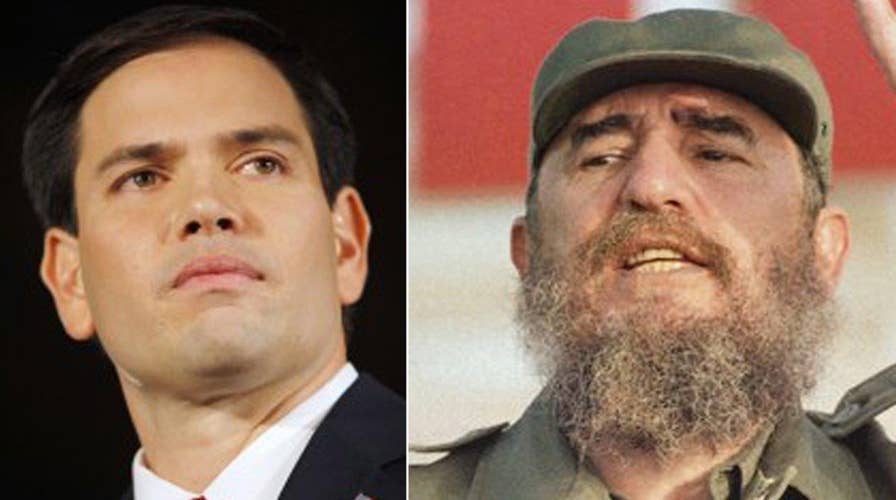Marco Rubio on what Castro's death means for Cuba
Florida senator weighs in on 'Fox & Friends'
President-elect Donald Trump said Saturday that the death of Cuba’s Fidel Castro “marks the passing of brutal dictator,” while President Obama argued that ‘history’ will be Castro’s final ‘judge.’
“Castro’s legacy is one of firing squads, theft, unimaginable suffering, poverty and the denial of fundamental human rights,” said Trump, who also expressed optimism about Castro’s death finally ending decades of communist oppression for Cubans.
"It is my hope that today marks a move away from the horrors endured for too long and toward a future in which the wonderful Cuban people finally live in the freedom they so richly deserve,” Trump said. “Our administration will do all it can to ensure the Cuban people can finally begin their journey toward prosperity and liberty.”
Castro’s death was announced Saturday on state television. He was 90. Castro’s younger brother, Raul Castro, remains Cuba’s leader.
“We extend a hand of friendship to the Cuban people,” Obama said. “History will record and judge the enormous impact of this singular figure on the people and world around him. … For nearly six decades, the relationship between the United States and Cuba was marked by discord and profound political disagreements.
“During my presidency, we have worked hard to put the past behind us. … This engagement includes the contributions of Cuban Americans, who have done so much for our country and who care deeply about their loved ones in Cuba.”
Trump, in his successful White House bid, railed against numerous international deals that he argued put the U.S. at a disadvantage, including one Obama made to normalize relations with Cuba, a communist country and long-time Cold War enemy.
In 2014, Obama announced a diplomatic effort that would easy travel and trade between the countries. And last year, Obama took Cuba off America’s state-sponsored terror list, amid criticism about continuing human rights violations on the island nation.
“Every single aspect of this deal is in Cuba’s favor,” Trump said during this year’s GOP presidential primary debates.
Florida GOP Rep. Ileana Ros-Lehtinen -- who was born in Havana in 1952 and whose family eight years later fled Castro’s regime -- told Fox News on Saturday that Trump criticized Obama’s 2014 deal because the U.S. made concessions “in exchange for nothing,” including Cuba releasing no American political prisoners.
Ros-Lehtinen’s congressional district includes Miami, where for decades Cubans have come to live.
But whether the Cuba agreement made by Obama through executive order, or whether Castro’s death improves the potential to improve the two countries’ relationship, remains unclear.
Florida GOP Sen. Marco Rubio, whose parents emigrated from Cuba before Castro’s rise in 1959, said on Fox News that the ex-dictator’s death was a newsworthy event but that he “didn’t think it would change anything,” or at least while Raul Castro remains in power.
Rubio, a 2016 GOP presidential candidate and potential 2020 contender, also argued that Obama attending Castro’s funeral or sending a top-level administration official would validate the life of somebody who oversaw the “assassination of Americans.”
Texas GOP Sen. Ted Cruz, whose father was born in Cuba, said: “Fidel Castro's death cannot bring back his thousands of victims, nor can it bring comfort to their families."
"Today we remember them and honor the brave souls who fought the lonely fight against the brutal communist dictatorship he imposed on Cuba," continued Cruz, also a 2016 GOP presidential candidate.
Trump was among the first Washington leaders to react to the announcement of Castro’s death, exclaiming on Twitter: “Fidel Castro is dead!”
Vice President-elect Mike Pence tweeted: "The tyrant #Castro is dead. New hope dawns. We will stand with the oppressed Cuban people for a free and democratic Cuba. Viva Cuba Libre!"













































